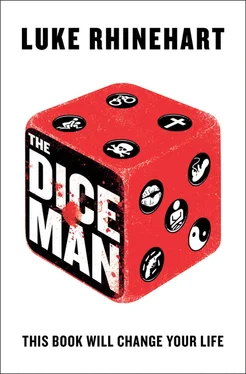‘And that, and that. You’ve absolutely no end of home entertainments. Don’t forget to call in the elevator man for a quick one when Evie is having her rest time.’
My right arm around her, I walked us into our bedroom. While I finished dressing, she watched quietly, standing next to the big bed with arms folded and elbows out. She saw me to the door and after we had exchanged a farewell kiss of less than great passion she said quietly with a bemused, almost interested expression on her face:
‘I don’t even have my yoga anymore.’
I shared my office on 57th Street with Dr Jacob Ecstein, young (thirty-three), dynamic (two books published), intelligent (he and I usually agreed), personable (everyone liked him), unattractive (no one loved him), anal (he plays the stock market compulsively), oral (he smokes heavily), non-genital (doesn’t seem to notice women), and Jewish (he knows two Yiddish slang words). Our mutual secretary was a Miss Reingold. Mary Jane Reingold, old (thirty-six), undynamic (she worked for us), unintelligent (she prefers Ecstein to me), personable (everyone felt sorry for her), unattractive (tall, skinny, glasses, no one loved her), anal (obsessively neat), oral (always eating), genital (trying hard), and non-Jewish (finds use of two Yiddish slang words very intellectual). Miss Reingold greeted me efficiently.
‘Mr Jenkins is waiting in your office, Dr Rhinehart.’
‘Thank you, Miss Reingold. Any calls for me yesterday?’
‘Dr Mann wanted to check about lunch this afternoon. I said “yes”.’
‘Good.’
Before I moved off to my patient, Jake Ecstein came briskly out of his office, shot off a cheerful ‘Hi, Luke baby, how’s the book?’ the way most men might ask about a friend’s wife, and asked Miss Reingold for a couple of case records. I’ve described Jake’s character ; his body was short, rotund, chubby: his visage was round, alert, cheerful, with horn-rimmed glasses and a piercing, I-am-able-to-see-through-you stare; his social front was used-car salesman, and he kept his shoes shined with a finish so bright that I sometimes suspected he cheated with a phosphorescent shoe polish.
‘My book’s moribund,’ I answered as Jake accepted a fistful of papers from a somewhat flustered Miss Reingold.
‘Great,’ he said. ‘Just got a review of my Analysis: End and Means from the AP Journal. They say it’s great.’ He began glancing slowly through the papers, placing one of them every now and then back onto his secretary’s desk.
‘I’m glad to hear it, Jake. You seem to be hitting the jackpot with this one.’
‘People are seeing the light –’
‘Er … Dr Ecstein,’ Miss Reingold said.
‘They’ll like it – I may convert a few analysts. ’
‘Are you going to be able to make lunch today?’ I asked. ‘When are you leaving for Philadelphia?’
‘Damn right. Want to show Mann my review. Plane leaves at two. I’ll miss your poker party tonight.’
‘Er … Dr Ecstein.’
‘You read any more of my book?’ Jake went on and gave me one of his piercing, squinting glances, which, had I been a patient, would have led me to repress for a decade all that was on my mind at that instant.
‘No. No, I haven’t. I must still have a psychological block: professional jealousy and all that.’
‘Er … Dr Ecstein?’
‘Hmmm. Yeah. In Philly I’m gonna see that anal optometrist I’ve been telling you about. Think we’re about at a breakthrough. Cured of his voyeurism, but still has visual blackouts. It’s only been three months though. I’ll bust him. Bust him right back to twenty-twenty.’ He grinned.
‘Dr Ecstein, sir,’ said Miss Reingold, now standing.
‘Seeya, Luke. Send in Mr Klopper, Miss R.’
As Jake, still carrying a handful of forms, exited briskly into his inner office, I asked Miss Reingold to check with Queensborough State Hospital about my afternoon appointments.
‘Yes, Dr Rhinehart,’ she said.
‘And what did you wish to communicate to Dr Ecstein?’
‘Oh, Doctor,’ she smiled doubtfully. ‘Dr Ecstein asked for the case notes on Miss Riffe and Mr Klopper and I gave him by mistake the record sheets of our last year’s budget.’
‘Don’t worry, Miss Reingold,’ I replied firmly. ‘This may mean another breakthrough.’
It was 9.07 when I finally settled into my chair behind the outstretched form of Reginald Jenkins on my couch. Normally nothing upsets a patient more than a late analyst, but Jenkins was a masochist: I could count on him assuming that he deserved it.
‘I’m sorry about being here,’ he said, ‘but your secretary insisted I come in and lie down.’
‘That’s quite all right, Mr Jenkins. I’m sorry I’m late. Let’s both relax and you can go right ahead.’
Now the curious reader will want to know what kind of an analyst I was. It so happens that I practiced non-directive therapy. For those not familiar with it, the analyst is passive, compassionate, non-interpretive, non-directing. More precisely, he resembles a redundant moron. For example, a session with a patient like Jenkins might go like this:
JENKINS: ‘I feel that no matter how hard I try I’m always going to fail; that some kind of internal mechanism always acts to screw up what I’m trying to do.’
[Pause]
ANALYST: ‘You feel that some part of you always forces you to fail.’
JENKINS: ‘Yes. For example, that time when I had that date with that nice woman, really attractive – the librarian, you remember – and all I talked about at dinner and all evening was the New York Jets and what a great defensive secondary they have. I knew I should be talking books or asking her questions but I couldn’t stop myself.’
ANALYST: ‘You feel that some part of you consciously ruined the potential relationship with that girl.’
JENKINS: ‘And that job with Wessen, Wessen and Woof. I could have had it. But I took a month’s vacation in Jamaica when I knew they’d be wanting an interview.’
‘I see.’
‘What do you make of it all, Doctor? I suppose it’s masochistic.’
‘You think it might be masochistic.’
‘I don’t know. What do you think?’
‘You aren’t certain if it’s masochistic but you do know that you often do things which are self-destructive.’
‘That’s right. That’s right. And yet I don’t have any suicidal tendencies. Except in those dreams. Throwing myself under a herd of hippopotamuses. Or’potami. Setting myself on fire in front of Wessen, Wessen and Woof. But I keep goofing up real opportunities.’
‘Although you never consciously think of suicide you have dreamed about it.’
‘Yes. But that’s normal. Everybody does crazy things in dreams.’
‘You feel that your dreaming of self-destructive acts is normal because …’
The intelligent reader gets the picture. The effect of non-directive therapy is to encourage the patient to speak more and more frankly, to gain total confidence in the non-threatening, totally accepting clod who’s curing him, and eventually to diagnose and resolve his own conflicts, with old thirty-five-dollars-an-hour echoing away through it all behind the couch.
And it works. It works precisely as well as every other tested form of psychotherapy. It works sometimes and fails at others, and its success and failures are identical with other analysts’ successes and failures. Of course at times the dialogue resembles a comedy routine. My patient the second hour that morning was a hulking heir to a small fortune who had the build of a professional wrestler and the mentality of a professional wrestler.
Читать дальше












